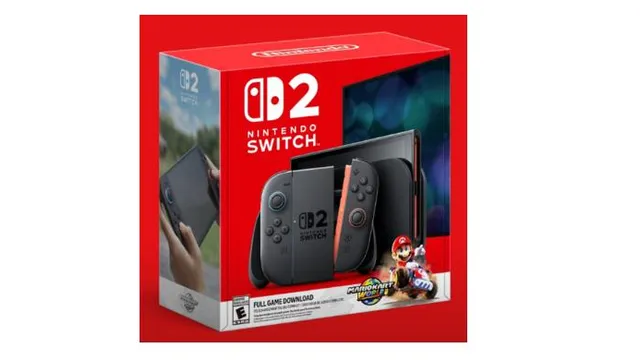
Nintendo delays U.S. pre-orders for Switch 2 amid Trump tariffs
2025-04-07 11:56- Nintendo has postponed U.S. pre-orders for the Switch 2 originally scheduled for April 9 due to the impact of President Trump's new tariffs.
- The global launch date for the Switch 2 remains unchanged at June 5, 2025, though there is significant concern about production costs and pricing.
- Consumer backlash has been significant, with many gamers expressing frustration over the intersection of politics and gaming.
Express your sentiment!
Insights
In the United States, Nintendo has announced a significant delay for pre-orders of the much-anticipated Switch 2, initially set for April 9, 2025. This delay has been attributed to the impact of new global tariffs implemented by President Donald Trump, which were introduced shortly after the Switch 2's pricing announcement. These tariffs specifically target imports from Japan and Vietnam, where a considerable portion of the console's production occurs. As a result, Nintendo is currently assessing the ramifications of these tariffs on their pricing and manufacturing processes, leading to considerable public outcry from gamers who are disappointed by the delays. The upcoming console, which will launch on June 5, 2025, is priced at $449.99. This price reflects a substantial increase—$150 more than its predecessor, the original Switch. The decision to delay the launch comes amid broader economic volatility, particularly plummeting stock market indices like the DOW and NASDAQ, which have seen dramatic drops in recent days. Furthermore, Nintendo has not disclosed a new pre-order date, exacerbating frustration among its consumer base, especially in the U.S., which is a primary market for the gaming industry. The reaction on social media has been intense and politically charged, with many fans voicing their frustration and connecting the tariffs to broader political issues. Some commentators have blamed the financial and technological difficulties faced by Nintendo on the administration's policies. The pre-order system remains active in other countries despite the delayed launch in the U.S., highlighting a disparity in pre-order availability that could further upset consumers in the American market. Nintendo's unique pricing strategy also came under scrutiny with the recent announcement of the $80 price tag for its upcoming game, Mario Kart World, which some see as a reflection of the changing economic landscape. As Nintendo navigates this challenging situation, it faces considerable pressure not only from consumers but also from the increasing difficulties imposed by external economic factors. This situation underscores the delicate intersection of politics and consumer electronics, especially as companies reassess their strategies in response to changing tariffs and market conditions. Overall, the implications of the tariffs and the subsequent delay of pre-orders may have ramifications not just for Nintendo but for the gaming industry as a whole, including competitors like Microsoft and Sony, which also rely on international supply chains.
Contexts
The impact of tariffs on video game console prices has been a significant topic of discussion in the gaming industry, especially in light of changing trade policies and economic conditions. Tariffs imposed on imported goods, including video game consoles, can directly affect their retail prices. When tariffs are enacted, manufacturers may either absorb the additional costs or pass them on to consumers, leading to increased retail prices. This dynamic can influence consumer behavior, potentially reducing demand for consoles that become more expensive due to tariffs. Understanding this impact is crucial for stakeholders within the industry including manufacturers, retailers, and consumers. Historically, the imposition of tariffs on electronic goods, particularly from major manufacturing countries, has resulted in fluctuations in console prices. For instance, in recent years, tariffs on imports from countries such as China have led to price hikes for several popular gaming consoles. This situation not only affects gamers but also has broader implications for the industry, including potential shifts in market share as consumers may turn to alternative products that remain competitively priced. As video game consoles are often discretionary purchases, a price increase can deter potential buyers, leading to lower sales volumes and slower growth within the industry. Moreover, the impact of tariffs can vary by region and market condition. In some cases, companies may adjust their pricing strategy in response to local economic factors, such as disposable income levels and the competitive landscape. Furthermore, the introduction of new models and technology can also influence pricing, as companies strive to maintain or grow their market position regardless of tariff impacts. Understanding these multifaceted relationships is essential for anticipating the long-term effects of tariffs on the video game console market. Evaluating how console manufacturers react to these tariffs can provide insights into future pricing trends and market strategies. In conclusion, tariffs play a pivotal role in shaping the pricing dynamics of video game consoles. The adjustments made by manufacturers in response to tariffs can have immediate repercussions for the market, influencing consumer choices and overall industry growth. As global trade policies continue to evolve, ongoing analysis will be crucial in understanding their effects on the prices of video game consoles and the gaming experience for consumers. Stakeholders must remain vigilant and adaptable to mitigate any negative consequences while seizing opportunities that may arise from these economic changes.